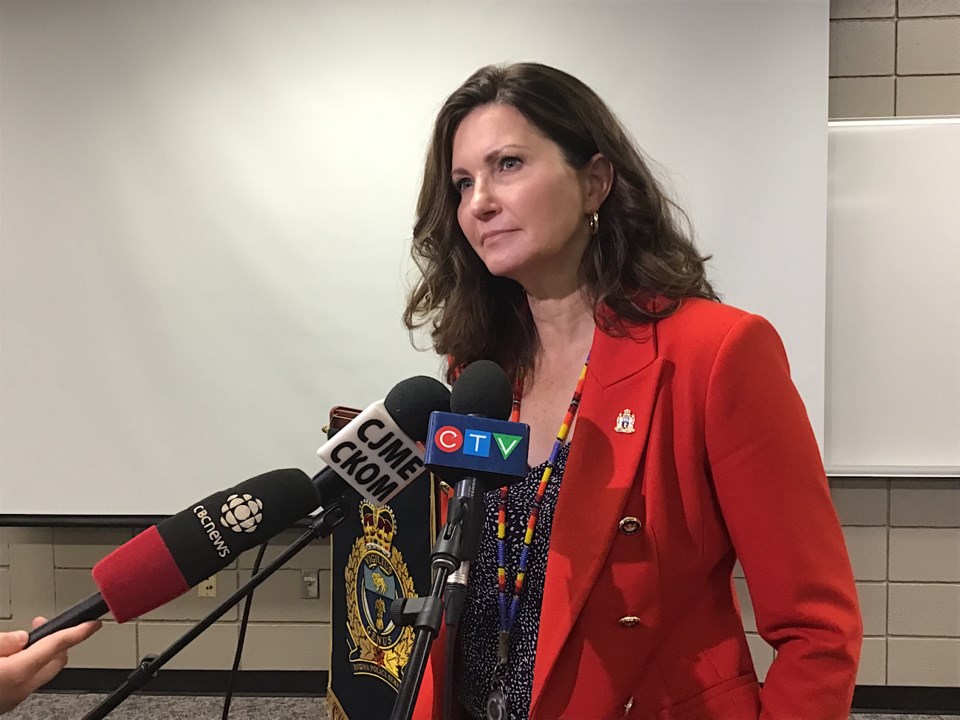REGINA — An ongoing discussion was back before the meeting of the Regina Board of Police Commissioners Tuesday.
That concerns whether Regina Police Service should bring in body-worn cameras to be used by members while out on duty.
Supporters of body cameras say it could help hold police accountable with respect to their interactions with the public, and address the issues of police brutality and racism. The issue has come to the forefront in the wake of highly publicized incidents such as with George Floyd in Minneapolis. Prime Minister Justin Trudeau has also called for police to institute body-worn cameras.
In Saskatchewan, body-worn cameras are already being used by Saskatoon police as a pilot project. The question is whether Regina should also follow suit.
In Regina, body-worn cameras were discussed at the Board of Police Commissioners meeting last November. As a follow up to that discussion, this week the board heard a report on the accountability and oversight measures currently in place with Regina Police Service.
The report, presented Tuesday, outlined a number of measures in place such as supervisory oversight, use of force reporting and vehicle pursuit reporting, a professional standards section to respond to all concerns, complaints and misconduct matters, the use of an investigation observer from the Ministry of Justice and independent units such as the Sask. Serious Incident Response Team and Sask. Public Complaints Commission.
The report also pointed to the other cameras and video systems in place right now, including in-car police cameras and the police force’s detention and building camera system. Currently, in-car cameras are in 87 police vehicles, and there are 67 cameras in the detention area.
The thinking is that adding body cameras could further enhance the ability to hold police accountable by recording their interactions, and be a resource when responding to complaints from the public about their experiences with the police.
But it comes at significant costs, upwards of millions of dollars.
“It’s easy for me to say we’re doing it,” said Chief of Police Evan Bray in speaking to reporters. “But ‘we are doing it’ could mean $6 million to the police budget.”
The police chief acknowledged there were many benefits to body cams. Whether or not to proceed is something the board must still decide down the road.
“Really it comes down to a cost-benefit analysis,” said Bray. “And that’s why the board requested of us: what else is happening to hold you accountable? And, as we talked about today, there’s a series of things, right down to the radios that our officers wear on their uniform belt every day have GPS built into them. So, we can always show at any given time where our officers were, where they weren’t, how long they were in a location, all of those things. Our cars have that as well (and) in-car camera, and then of course all of the provincial bodies that provide oversight, investigations, those type of things.”
The police chief indicated the report on all the accountability mechanisms currently in place will help inform the board when they consider the issue of adding body-worn cameras.
“In the case of body-worn cameras, that’s going to be a future discussion that we will be having with the board. Is this an area we want to go down, knowing that we have all these other accountability mechanisms, do we feel that the benefit of body-worn camera is enough that the investment, time and resources that we’re going to put into it is worth it?”
It is possible Regina could opt for body cameras on a more limited basis. Instead of “rolling out 430 body cameras to every police officer,” Bray said perhaps they could focus on areas where there is more high-risk interactions.
It is expected there will be more follow up discussions in the future on body-worn cameras. Bray welcomed a thoughtful discussion on the whole issue.
“We're ultimately deciding how we are spending taxpayers’ dollars. At a time where budgets are heavily scrutinized, we need to make sure we're making a decision that’s in the best interest of our city and is something that is needed and that is a valuable add to our service.”
Bray said he had been in contact with Saskatoon police regarding their body-worn camera program. So far, it seems to have gone well.
“I spoke with Chief (Troy) Cooper about it. It’s predominantly been effective in showing the work that their officers have been doing and dispelling or negating complaints that come in. There’s been a couple of occasions where they’ve had complaints, they have been able to review the body-worn camera, and proved that didn’t happen. But it’s been a bit of a bigger cost than they expected as well.”
Mayor Sandra Masters was at the meeting Tuesday and noted Regina was in a different situation than Saskatoon when it came to resources.
“We know that our patrol officers have some of the highest caseloads in the country, and so its hard to justify $4 to $6 million on body cams when we’re still under-resourced from a personnel perspective,” said Masters.
She noted from a resourcing perspective, Saskatoon has more officers, and they also have had an aerial unit for 10 years when Regina is just getting an aerial unit now by the end of this year.
Masters said body cameras were an “extra tool, and I think as an extra tool it would be nice to have. Is it absolutely necessary? I’m not there yet, again from the investment perspective, there’s still some catch-up left to do.”
— Click for more from Crime, Cops and Court.




